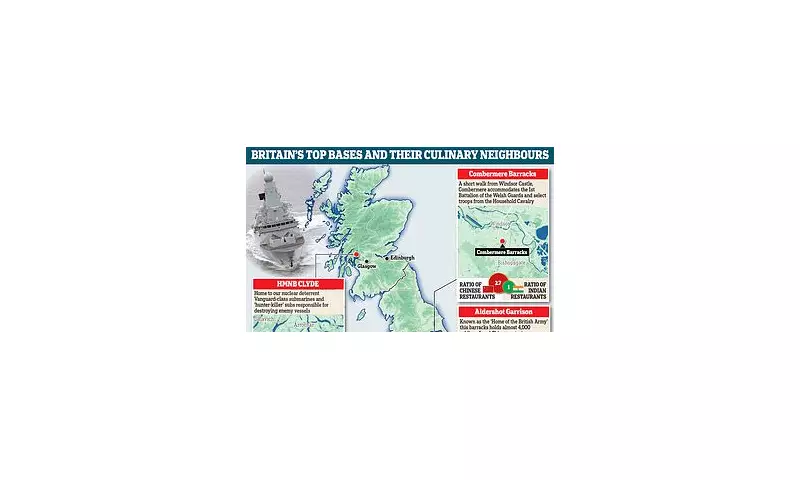
Unusual Restaurant Patterns Near Sensitive Sites
An investigation has revealed a curious geographical pattern surrounding some of Britain's most sensitive military installations. According to business analytics, Chinese restaurants appear in disproportionately high numbers near critical defence facilities compared to other ethnic eateries.
The findings come two years after police investigated claims that a popular Glasgow Chinese restaurant, Loon Fung on Sauchiehall Street, was operating as a covert Chinese police station. While Police Scotland found no evidence of criminal activity, the incident raised broader questions about potential surveillance operations on UK soil.
Military Bases and Restaurant Ratios
HMNB Clyde, home to Britain's nuclear deterrent submarines, shows a remarkable 2.9:1 ratio of Chinese to Indian restaurants in the surrounding area. All vessels leaving this highly secretive base must pass through waters near these establishments.
Even more striking is the situation around HMNB Devonport in Plymouth, western Europe's largest naval facility. Here, the ratio jumps to an astonishing 7:1 in favour of Chinese restaurants near the 650-acre base that houses the Navy's largest amphibious vessels and reconnaissance units.
Other sensitive sites show similar patterns. Portsmouth Naval Base, hosting two-thirds of the Royal Navy surface fleet including the aircraft carriers HMS Queen Elizabeth and HMS Prince of Wales, has 2.3 Chinese restaurants for every Indian establishment nearby.
The pattern extends beyond naval facilities. Aldershot Garrison, known as the 'Home of the British Army', shows 1.7 Chinese restaurants per Indian eatery. Similarly, RNAS Culdrose in Cornwall, crucial for anti-submarine warfare operations, and Combermere Barracks in Windsor, housing prestigious Household Cavalry regiments, both demonstrate significantly higher concentrations of Chinese restaurants in their vicinity.
Background of Security Concerns
These findings emerge against a backdrop of increasing official concern about Chinese espionage activities in the UK. In August, the Government acknowledged that 'instances of China's espionage, interference in our democracy and the undermining of our economic security have increased in recent years.'
MI5 chief Ken McCallum recently confirmed that the security service had acted to neutralise a Chinese threat to national security within the past week. The Ministry of Defence has already taken precautionary measures, banning electric vehicles with Chinese components from parking within two miles of certain buildings at RAF Wyton and other establishments.
The 2017 Chinese National Security Law adds another layer of concern. Article 14 states that intelligence organs may demand that 'concerned organs, organisations, or citizens provide needed support, assistance and cooperation,' potentially placing the approximately 500,000 Chinese nationals in Britain in a difficult position.
While there's no suggestion that any specific Chinese restaurants are involved in espionage, the unusual distribution patterns near strategically vital sites have raised eyebrows among security analysts. The overwhelming majority of these establishments are legitimate businesses serving their communities, but the geographical coincidence has prompted closer scrutiny amid growing tensions between London and Beijing.





